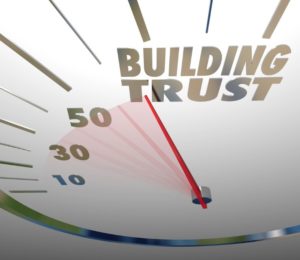 We are always talking about the importance of making a meaningful connection with your qualified caseload donor so that you continue to build trust in your relationship.
We are always talking about the importance of making a meaningful connection with your qualified caseload donor so that you continue to build trust in your relationship.
But what is a meaningful connection?
Our technical definition of a meaningful connection is this:
A “meaningful connection” is a two-way contact (face-to-face, phone, email, text) made by a MGO, that moved the donor into a deeper relationship with the organization. For example, it moved a donor toward an ask, the MGO learned something significant about the donor, and/or the MGO finally heard back from a donor. (Tweet it!)
Note these important phrases:
- Two-way – something is coming back from the donor.
- Moved the donor – something actually happens as a result of your communication. You moved the donor.
- Deeper relationship – the relationship went to a deeper place.
If your strategy, touchpoints, communication, etc. is not having these kinds of results, then you are not creating a meaningful connection.
Here’s an example we saw from a MGO we work with (although it’s been modified to protect the identity of the MGO and the donor):
The MGO has just learned that the spouse of a good donor has passed away. So she writes the surviving spouse this letter…
Dear Bill,
I was so saddened to learn of Mary’s passing today and I want to express my deepest condolences to you and your family. Our prayers are with you all as you continue to walk through the tremendous loss of your wife.
It was a true joy to have shared coffee and chocolate chip cookies with you both, just last month. Though I knew Mary briefly, I could see how loved and cherished she was by you and your family. Most of all, it was such a gift to witness her deep love for our Heavenly Father as she welcomed me into the home that you shared.
In this time of sorrow and healing, I hope you will allow me to share a fond memory I have of Mary.
If you can believe it, that afternoon last month was the first time I ever drank a full cup of coffee. I have never been a coffee enthusiast, but Mary encouraged me to try it. Without a doubt, it was the best coffee I have ever had! We chatted about your big hearts for our work and your many travels. At one point, Bill, you went searching for a newspaper article about your old home in Portland.
While you were looking for it, I asked your sweet wife: “Mary, what has brought you the most joy in your life?”
Without a moment’s hesitation, Mary responded: “my marriage.” She shared that her marriage with you, Bill, and everything that has flowed from that – your kids, grandkids, dear friends, traveling adventures – filled her life with so much joy and love.
This love that you and Mary shared will never be lost, for our God shelters those memories deep within your heart. And the legacy of this love will live on in your family, friends, even in the lives those you both blessed through your partnership in our work.
To this day, every time I drink a cup of coffee I am reminded of you and Mary, and of the deep love you shared in your seventy-four years of marriage and the impact of that love in the people and community around you.
Mary has gained eternity in heaven, and I know that Jesus is welcoming her home, as she welcomed so many into the home that you built together.
With my deepest sympathy,
MGO Name
This is powerful. And what you can see here is:
- An encounter last month that was meaningful. The MGO connected and talked about real life and how the donor is connected to the work the MGO represents. Notice how the MGO asked the question: “What has brought you the most joy in your life?” This is a great question that can open up all kinds of conversation and move the connection you are making to a deeper level.
- Ongoing communication that is meaningful and deep. The MGO sincerely, and with great feeling and emotion, continues to communicate in a meaningful way.
We know that this relationship will continue to grow. And it will produce economic results for the organization. Why? Because there is a genuine interest and concern for the donor, separate from the money.
This is what you need to do in all of your donor relationships. Find a way to do it.
Richard






First, I hope that the non-profit is a Christian religious organization and that the donor is of the same faith. Otherwise, I find the tone of the message over the top, presumptuous, and out of place. Second, I can’t help but read this only as a condolence letter, with a nice memory shared. It doesn’t bring the letter recipient back to the organization at all. Third, I struggle with the wisdom of using such a personal moment in someone’s life as an opportunity to make a meaningful connection designed to increase a donor’s willingness to support your organization. It just doesn’t seem like the right time to me. That said, the definition of a meaningful connection at the top of the post is helpful.
Too long. First few paragraphs are touching and genuine and then you lost me.
I think the letter is lovely – I do not work for a Christian organization but have connected with donors through our shared faith. Connecting with a donor can be done in many ways, it is building trust and a relationship together that furthers the relationship to your organization. The more one trusts and likes you that more they open up and can truly share what it is they want to do philanthropically.
The deep religious nature of this letter indicates that there is a church connection between the parties – if not, it is highly inappropriate. From my personal point if view, it is too intrusive – the writer met the woman once, and is now writing to the widower with information about his late wife’s deeply held beliefs. Pretty presumptuous, even intrusive….
In this case, it is a Christian organization and the gift officer made a genuine connection at the meeting – her first with the donor, but not the donor’s first with organization staff. In fact, the relationship was quite extensive and deep. She shared a very genuine memory and conversation exchange that was very meaningful to the husband, so much so, he called to thank her and requested a future visit. The key here is the gift officer exercised discernment and her written expression in the letter matched her face-to-face communication. In other words, the letter was authentic to her and the donor recognized it. By taking the time to be so deeply personal, she gave a great gift to this gentleman – words about how the wife felt about him and their family together. These are words he will likely cherish the rest of his life. It was a sincere authentic meaningful connection.